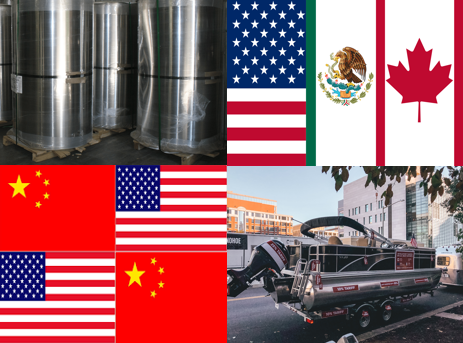NMMA: Trade War Status a Mix of Good, Bad for Boating Industry

With 2018 drawing to a close, the trade-related obstacles that the recreational boating industry will face in the new year are coming into focus. While NMMA is encouraged by some recent updates in the trade war, many of the challenges that plagued marine manufacturers for the better part of this year will carry over into 2019.
The official signing of the new NAFTA trade agreement – now known as the United States-Mexico-Canada Agreement (USMCA) – in late November was welcomed by the industry, who are hopeful the U.S. Congress will ratify the deal in early 2019. However, NMMA faulted USMCA for failing to address one of the recreational boating industry’s biggest issues: eliminating retaliatory tariffs on U.S. boats.
In response to USMCA’s formal signing, NMMA president, Thom Dammrich, and NMMA Canada president, Sara Anghel, stated, “While the official signing of USMCA is encouraging, the challenges created by the aluminum and steel tariffs and subsequent retaliation far outweigh our enthusiasm. Negotiators should capitalize on the goodwill created by this agreement and immediately remove Section 232 tariffs and retaliatory measures – thousands of businesses and jobs in Canada, Mexico, and the U.S. are counting on it.”
Canadian and Mexican retaliatory tariffs – coupled with those levied by the European Union – have all but dried up U.S. boat exports to markets that account for nearly 70 percent of the U.S. industry’s international sales. NMMA fears the industry will face irreparable harm if there is not a solution to this problem soon.
In a positive development, U.S. President Trump and Chinese President Xi announced a temporary ceasefire in the trade war on December 1, with the goal of striking a negotiated agreement by March 1, 2019. As part of the deal, President Trump agreed not to increase Section 301 tariffs on $200 billion worth of Chinese goods (List 3) from 10 to 25 percent on January 1, 2019.
The conflict between China and the U.S. has hit the industry particularly hard, with more than 350 commonly used marine products and boats being targeted. NMMA expressed optimism that the detente will lead to the removal of all tariffs on these items and free and fair trade with China. Simultaneously, NMMA is urging the U.S. government to establish an exclusion process for items on List 3 – a system that has only been implemented for the first two lists.
Perhaps the most concerning news came last Friday when the U.S. International Trade Commission (ITC) issued its final decision in the antidumping and countervailing duty investigations into common alloy aluminum sheet from China, which affirmed the Trump administration’s 96.3 percent to 176.2 percent duties on the material. Leading up to the ITC’s action, NMMA urged the government to remove all duties on aluminum sheet in official comments and testimony, arguing the tariffs were causing significant harm to the industry.
Because of these investigations, boat builders are seeing a 30 to 40 percent price increase for aluminum sheet, even though the vast majority source the material domestically. In addition, the compounding tariffs on Chinese aluminum sheet have strained the global supply, making it difficult for to find enough aluminum sheet to keep up with manufacturing demand.
As Dammrich put it, “The ITC’s decision is troubling news for marine manufacturers and the people they employ. Aluminum boats represent 44 percent of new boats sold each year and account for approximately 22,000 American jobs.”
In a bit of good news for the industry, the ITC also issued a negative critical circumstances decision. As a result, imports of aluminum sheet from China will not be subject to retroactive antidumping or countervailing duties – meaning importers with entries during the 90-day retroactive periods from exporters subject to critical circumstances will have their liability for any duties during those time periods released. This will not happen, however, until the U.S. Department of Commerce instructs Customs and Border Patrol to release the funds.
Looking ahead to 2019, trade will continue to be a top NMMA advocacy priority. In addition to the groundwork laid in 2018, this effort will be aided by the recent election of NMMA senior vice president of government relations and legal affairs, Nicole Vasilaros as vice-chair of the International Trade Advisory Committee (ITAC) on Consumer Goods – which provides policy and technical advice and recommendations to the U.S. Secretary of Commerce and the United States Trade Representative regarding trade barriers, negotiations of trade agreements, and implementation of existing trade agreements affecting industry sectors.


 Advertising
Advertising